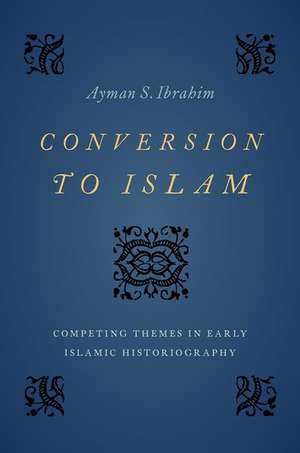Conversion to Islam: Competing Themes in Early Islamic Historiography
Autor Ayman S. Ibrahimen Limba Engleză Hardback – 15 apr 2021
Preț: 582.12 lei
Preț vechi: 706.69 lei
-18% Nou
Puncte Express: 873
Preț estimativ în valută:
111.42€ • 121.07$ • 93.66£
111.42€ • 121.07$ • 93.66£
Carte disponibilă
Livrare economică 20-26 martie
Preluare comenzi: 021 569.72.76
Specificații
ISBN-13: 9780197530719
ISBN-10: 0197530710
Pagini: 320
Dimensiuni: 236 x 160 x 25 mm
Greutate: 0.59 kg
Editura: Oxford University Press
Colecția OUP USA
Locul publicării:New York, United States
ISBN-10: 0197530710
Pagini: 320
Dimensiuni: 236 x 160 x 25 mm
Greutate: 0.59 kg
Editura: Oxford University Press
Colecția OUP USA
Locul publicării:New York, United States
Recenzii
... Ibrahim has written a significant contribution to the study of Arabic historical writing, on one hand, and the phenomenon of conversion to Islam, on the other. The bulk of material that Ibrahim uses as his source is vast, and the analysis of it is of high quality.
Thought provoking, meticulously researched, and clearly written.
This remarkably thorough book overturns the facile notion that the first Muslim historians had little to say about conversion to Islam. Ayman Ibrahim tracks down the myriad stories they told about the all-important conversions of Muhammad's inner circle, showing how the political and religious commitments of each writer guided his narrative. He has given us an authoritative account of conversion themes and topoi in the debates that tore the early Muslim community apart. It is a book that has much to teach us about how conversion was represented and imagined in early Islamic history
Reading Conversion to Islam is an education. Ibrahim has used his vast knowledge of early Arabic historical works and encyclopedic grasp of secondary scholarship on them to produce a compelling and important study of how medieval Muslim historians wrote about conversion. This book is a wonderful achievement
Ayman Ibrahim's newest study is his most comprehensive so far. Until now, Ibrahim has demonstrated a thorough grasp of the Arabic sources, and this volume on conversion, which could almost serve as an introduction to the early Islamic sources in Arabic, does not disappoint. He gives the reader a very thorough discussion of the issue of conversion to Islam as it is portrayed in the earliest sources, not shying away from the many problematic issues such a study entails. This survey is sure to be a fundamental work not merely on conversion but also on Arabic historiography for years to come
How was conversion to Islam remembered by medieval Muslim scholars? Working at the intersection of history and historiography, Ayman Ibrahim illuminates multilayered discourses on conversion and offers a sensible typology of evolving literary themes and narratives in the source material. In so doing, Ibrahim sheds a fresh light on the memory of one of the most significant social and cultural changes of the formative period of Islam
Ibrahim's detailed analysis undoubtedly fills a surprisingly large research gap and provides an exciting and deep insight into the different contexts, motives and intentions of Muslim historiography regarding the topic of conversion.
Thought provoking, meticulously researched, and clearly written.
This remarkably thorough book overturns the facile notion that the first Muslim historians had little to say about conversion to Islam. Ayman Ibrahim tracks down the myriad stories they told about the all-important conversions of Muhammad's inner circle, showing how the political and religious commitments of each writer guided his narrative. He has given us an authoritative account of conversion themes and topoi in the debates that tore the early Muslim community apart. It is a book that has much to teach us about how conversion was represented and imagined in early Islamic history
Reading Conversion to Islam is an education. Ibrahim has used his vast knowledge of early Arabic historical works and encyclopedic grasp of secondary scholarship on them to produce a compelling and important study of how medieval Muslim historians wrote about conversion. This book is a wonderful achievement
Ayman Ibrahim's newest study is his most comprehensive so far. Until now, Ibrahim has demonstrated a thorough grasp of the Arabic sources, and this volume on conversion, which could almost serve as an introduction to the early Islamic sources in Arabic, does not disappoint. He gives the reader a very thorough discussion of the issue of conversion to Islam as it is portrayed in the earliest sources, not shying away from the many problematic issues such a study entails. This survey is sure to be a fundamental work not merely on conversion but also on Arabic historiography for years to come
How was conversion to Islam remembered by medieval Muslim scholars? Working at the intersection of history and historiography, Ayman Ibrahim illuminates multilayered discourses on conversion and offers a sensible typology of evolving literary themes and narratives in the source material. In so doing, Ibrahim sheds a fresh light on the memory of one of the most significant social and cultural changes of the formative period of Islam
Ibrahim's detailed analysis undoubtedly fills a surprisingly large research gap and provides an exciting and deep insight into the different contexts, motives and intentions of Muslim historiography regarding the topic of conversion.
Notă biografică
Ayman S. Ibrahim is the Bill and Connie Jenkins Professor of Islamic Studies at Southern Seminary and Director of the Jenkins Center for the Christian Understanding of Islam. He is the author of The Stated Motivations for the Early Islamic Expansion.
